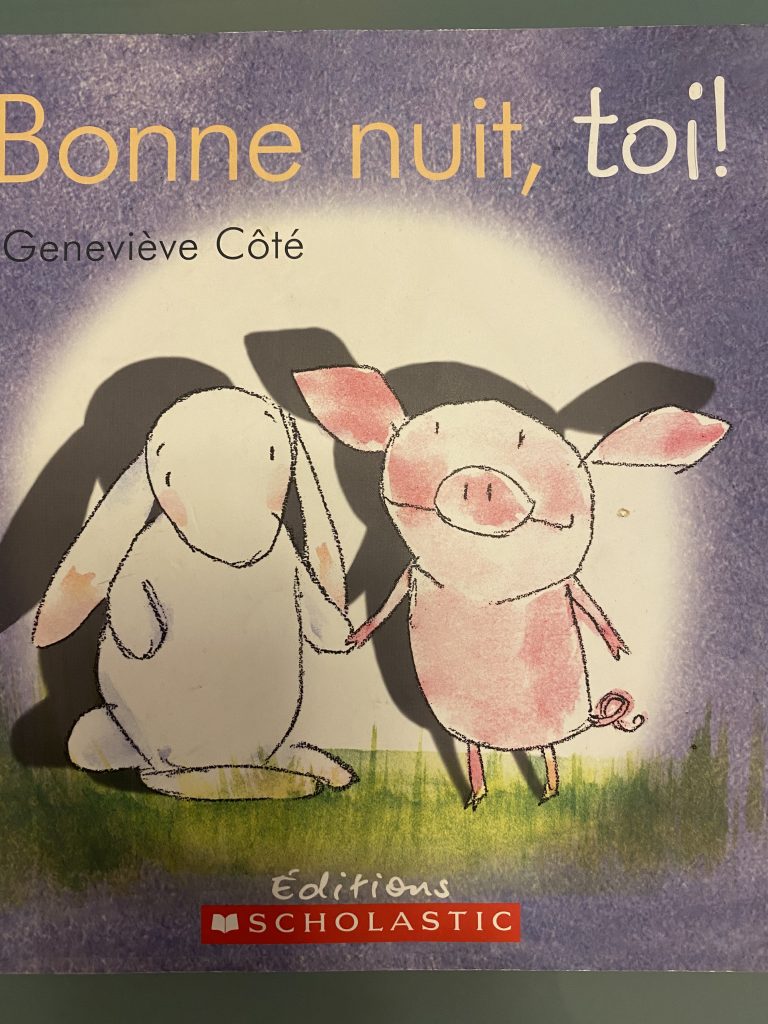Quality educational resources for at home learning are difficult to find when your child is in a French Immersion program. Most families with children in French Immersion do not have French Language at home. They are primarily any other language but French, making it a major challenge for parents to understand the educational content, and even harder to share it with their child in a meaningful way.
Reading To Children In Another Language Online Still Promotes Language Learning
I decided to try something new. I want to read to you and your child. I am sharing my family’s favorite bedtime story with your family today. This one is called “Bonne Nuit, Toi” or “Good Night, You”. It is a story about a little bunny and a little pig, who have their first camping sleeping over! Pig and Bunny take turns sharing their shadows on the side of the tent trying to spoke each other. Each one trying to out do the other. Until it gets dark, Pig is shy and embarrassed to admit he is afraid of the dark. Like a good friend, Bunny offers words of support and finds a away to emotionally connect with Pig, so they can continue to enjoy their evening.
Why “Bonne Nuit, Toi” Is A Fantastic Learning Story
I chose this story because whether you want to expose your young child or toddler to a new language or you have an early immersion child in Kindergarten, Grade 1 or Grade 2, this is a good story for vocabulary, emotional learning, and coping skills development.
All Babies From Newborn to 9 Months Are International Language Learners
Conseil Scolaire de la colombie-Britannique (CSF)
The CSF has done research to support Francophone development and language learning. Their research shows that children from newborn to age 9 months can pick up many sounds from various languages and towards 12 months of life will use words and sounds most common to their primary language. But you will notice that after even 6 months although infants will respond to voices in all languages openly, they may show favoritism for the language they hear the most at home. Their “cooing” sounds from 6 months plus will be more to the tones and dialects of their primary language. By 1 year, the child is able to form some words and communicate in a primary language,although, if early exposure to many, or more than one language has occurred, this has activated other areas of their brain during crucial phases of development.
So get cozy with your little one, and let me read to you in French. Some prompting questions you might want to ask or discuss with your child are:
- Have you seen your shadow? How does your shadow change in the evening? (it’s gets longer and bigger)
- Are you afraid of the dark? Why are you scared of the dark? (They can’t see as well, shadows of typical objects become scary, their imagination creates fear of monsters)
- What can you do to help feel less afraid? (night light, cuddle buddy, favorite book to look at, other bedtime coping tools you use in your home routine).
Not Sure About French Immersion Program for Your Child?
French Immersion Programs in Canada are designed for children who do not have French support at home. It is a benefit if they have any relative or direct family member to support language learning, but it is a program designed to not require additional home fluency in French.
In my opinion it is a type of learning by “submersion”. Six hours, 5 days a week of new language learning through application. Of course early on, kindergarten and grade 1 there is a lot of English translation. This is a different system than Francophone-core French school. Remember children catch on easily because they are young and their minds are really flexible. Children have a natural love to learn, they do not feel intimidated, they naturally are full of wonder and embrace the challenge. Their peers also play a huge role in their motivation to learn a new language. Everyone learns together and shares similar experiences. Consolidating the learning and strengthening peer relationships through their elementary school journey.
Are You Considering French Immersion?
Other articles for parents
Challenging parenting: Child with Dyslexia

